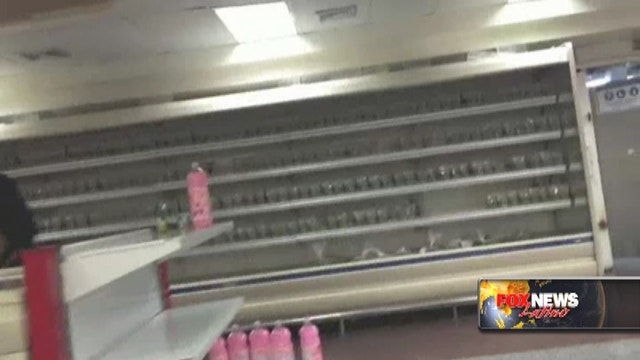Hungry Venezuelans find empty supermarket shelves
In Venezuela, where the economy is on the brink of collapse, food shopping has become an adventure.
Caracas, Venezuela – In almost any other country, going food shopping is an afterthought. You head to the market, buy food then head home.
But in Venezuela, where the economy is on the brink of collapse, food shopping has become an adventure.
There’s an hours-long wait to enter the supermarkets. Shelves are empty. Meat and chicken, and even diapers, are nowhere to be found. People are so desperate for food that fights break out in the aisles.
On May 31st, a line formed early in a supermarket in El Cafetal, located in eastern Caracas. It lasted until the store closed at 7 p.m. because they received wheat for the arepas, a product tough to find these days.
The line started outside of the mall’s parking lot, where the supermarket is located. People looking for wheat entered through a back door and continued to an aisle closed to the rest of the public.
In footage obtained by Fox News Latino, a young child is heard screaming and crying when a fight broke out. The child's mother was accused of being a bachaquera, what the government calls those who buy regulated goods to later resell on the black market.
The woman's young son screams "no!!!" and "mi mama (my mother)" when people threatened to report her to police.
Situations like this one are no longer unusual in Venezuela. There were more than 70 cases of looting or looting attempts in May, most of them in supermarkets, according to the Venezuelan Observatory of Social Conflict.
Sometimes looting begins when stores don’t sell products fast enough or run out of supplies.
According to local polling firm Datanalisis, scarcity in Caracas’ supermarkets reached 82 percent this year, meaning that people only find two out of every 10 items on their list.
“It’s been two years since the last time that we had enough food to fill up every shelf,” Jorge Luis Lastra, head of the worker’s union of Bicentenario Supermarket, the state-run grocery store chain that began operating in 2010.
Bicentenario is a clear example of how the economic crisis has hit Venezuela. The chain used to operate 32 stores around the country, but now 10 of those supermarkets are closed, some in the country’s biggest cities, including Caracas, Maracaibo and Valencia.
“In the coming months there could be more closures,” Lastra told Fox News Latino. “We were 8,500 workers and now we are down to 3,500.”
If you go to the meat or butcher section of any Bicentenario, you will find refreshment drinks or other products, but not meat or chicken. In the dairy department, there is just yogurt, if you are lucky.
In Bicentenario and other stores, employees apply a trick to deceive the public. To fill shelves they use any given product. That’s why it is possible to find an entire aisle full of vinegar, for instance.
In other places, like Farmatodo, a pharmacy and a convenient store, they eliminated more than three aisles to reduce the number of shelves to fill.
“We haven’t sold meat or chicken in more than a year. In fact, most of our stores don’t sell any kind of food with regulated prices (like milk, wheat, sugar),” Lastra told FNL.
This is why most Bicentenario stores don’t have the long lines the private supermarkets do.
In an effort to make the process more efficient, the government recently announced a new social program to sell bags of food directly to communities without making residents go to grocery stores.
But experts don’t think that strategy will work.
“Venezuela’s crisis is not about the distribution of food. The problem is that we are not producing,” Tomas Socias, an economist and a local expert on food production, told FNL.
In a recent survey, the Industrial Chamber of Venezuela, or Conindustria, revealed that 70 percent of its members said their production has dropped significantly since last year.
Since 1996, three years before Chavismo took power in 1999, 8,000 companies have shuttered, according to Conindustria. That’s a two-third decrease since 1993.
To make things worse, the government recently announced it will cut imports by 46 percent because of the shortage of dollars the country is facing.
Socias thinks that things could become worse in the upcoming months. If that’s true, buying food might become even a bigger adventure.








































